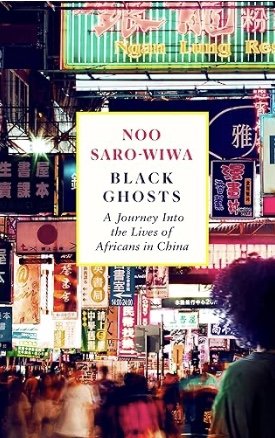Black Ghosts: A Journey into the Lives of Africans in China by Noo Saro-Wiwa (Canongate)
One of the more interesting and impenetrable parts of Hong Kong and beyond are the enclaves of African men who show up and clearly know their way around. In Kowloon’s Chungking Mansions, some are asylum seekers and many more are undocumented, there for “business.” Gordon Mathews, anthropology professor at the Chinese University of Hong Kong and author of Ghetto at the Center of the World (Asia by the Book, June 2012) and Globalization from Below, has taught English classes in Chungking Mansions for years and has gained the confidence of many African residents of that community. Everyone else receives a polite greeting in passing, at best.
Mathews writes about the community of Africans who live in Guangzhou and when Noo Saro-Wiwa learns about them, she goes to that city in search of them. Nigerian by birth and brought up in England, she holds a British passport and has studied at both King’s College, London and Columbia University. She has a unique position of Western privilege and an African birthright which leads her to feel confident that she will be able to discover how Africans live in the south of China.
She’s mistaken. Her attempts to penetrate a male world of men who live by their wits and without documentation are met with the usual reply of “We’re here to do business.” A few take her to dinner and to nightclubs but although she’s introduced to their friends, she still hits a wall when asking about their lives in China.
Guangzhou has neighborhoods that are largely occupied by men from Africa and Saro-Wiwa spends most of her time within these areas. She makes contact with a Nigerian fabric merchant who comes to Guangzhou for a month at a time several times a year. “I jealous these people,” he tells her with a “clenched admiration,” “What this country has and we do not have in our country is quite enormous…Enormous wealth. The U.S. don’t even have it.”
This wealth doesn’t trickle down to the area known as “Chocolate City,” a place dominated by a massive market that is a “bazaar of garishness.” There Africans and Chinese engage in a dance of commerce that is plagued by cross-cultural misunderstandings, acrimony, and racism. Saro-Wiwa encounters the racism quickly. Although she is clearly a visitor and a woman of means, vendors turn her away when she asks for a discount.
Despite the Chinese aversion to dark skin, there are a number of Guangzhou women who have married and started families with African men. This has created a kind of settled community, with mixed-race children and a tentative form of security. Still, she’s told, that although “no sane person will stay in Nigeria,” for these men whose Chinese wives and half-Chinese children allow them permanent residency status, “Every day you are being reminded of where you come from. I don’t belong here.”
Although eventually Saro-Wiwa discovers the businesses that keep the African afloat, including drug-dealing, she’s forced to flesh out her book with stories of her travels in other parts of China and facts garnered from her academic research. A seasoned travel writer who works for Conde Nast Traveler, she makes her solitary explorations enticing. She falls in love with Wuhan only months before covid shuts that city down and gives a splendid account of the northern town, Pingyao, whose antiquities escaped the depredations of the Cultural Revolution. She ends up taking refuge in the more hospitable area of Hong Kong where her research gains an increasingly intimate texture. Even so, Black Ghosts ends with the knowledge that her “journey into the lives of Africans in China” doesn’t live up to its subtitle. Saro-Wiwa hasn’t even illuminated the lives of Africans in Guangzhou.~Janet Brown
